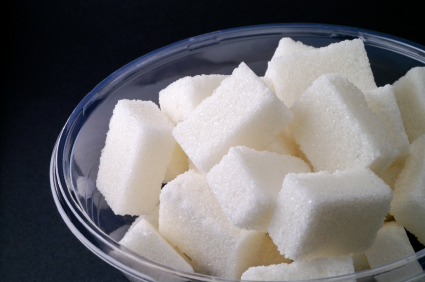Pink, blue, yellow… the color doesn’t matter. They’re all toxic.
You know them better as Splenda (sucralose), Equal (aspartame), and Sweet ‘N Low (saccharin). The FDA insists that artificial sweeteners are safe.
But aspartame alone has caused controversy since its approval in 1981.1 The side effects are bad enough… headaches, dizziness, nausea, memory loss, blurred vision, and depression. And then add to that list a link to cancer? No thanks. Bottom line: Avoid artificial sweeteners at all costs.
Why even chance it when there are other substitutes out there—natural, healthier ones? Including…
| Beware of hidden sugars. Many boxed and canned foods contain sugar. The only problem? The manufacturers don’t know want you to know what you’re eating. So they use secret code names for sugar. Look out for: sucrose, fructose, glucose, dextrose, galactose, lactose, maltose, corn syrup, and high-fructose corn syrup. You’ll even notice that many processed foods list sugar more than once – just using different names! |
1. Coconut Sugar – Made from the sap of cut flower buds of the coconut palm, coconut sugar is an ideal alternative. It does have just as many calories as regular sugar, but it has a low glycemic index which prevents blood sugar spikes. That makes it a perfect alternative for diabetics or anyone else watching their sugar intake. It is also a great source of potassium, which helps fight metabolic syndrome risk factors. But don’t be fooled. Even though it comes from a coconut, it doesn’t have its taste. Imagine something more along the lines of brown sugar. You can even swap it out for regular sugar for cooking and baking.
2. Raw Honey – Not all honey is the same. Most honey, probably the kind you have sitting in your pantry, is heavily processed. And that refined honey is no better than white table sugar. When we say honey we mean 100 percent raw organic honey. It hasn’t been heated, pasteurized, or processed in any way. Raw honey contains vitamins, minerals, and other nutrients. The darker the honey, the more nutrients and flavor. It is just as sweet as sugar, only much healthier. It also has antibacterial, antifungal, antiseptic, and antioxidant properties.
3. Blackstrap Molasses – With its robust bittersweet flavor, blackstrap molasses is the liquid byproduct of sugar cane. But don’t confuse blackstrap molasses with regular. They’re produced a bit differently. But that small change makes a huge difference. Blackstrap molasses contains an array of healthy minerals such as iron as well as vitamin B6, magnesium, and calcium. It also has more antioxidants than any other natural sweetener.2 This substitute also has a low glycemic index to help control blood sugar levels.
4. Stevia – This low-calorie natural substance is made from the sweetleaf plant native of South America. Stevia is much sweeter than regular sugar. So a little goes a long way. The leaves can be used whole or ground up in food and drinks. Its glycemic index is zero so it has no effect on your blood sugar.3 There are also no artificial ingredients in it. That doesn’t mean it’s without controversy. Some studies link it to liver mutations, fertility problems, and disruptions in energy metabolism.4 But only animals have experienced those effects. And only at very high levels of intake. Still, light to moderate usage is best. And when possible use the raw form.
5. Date Sugar – Made from dehydrated dates, it is loaded with fiber, vitamins, and minerals. It is best used for baking since it doesn’t dissolve very well in liquids. It makes a great alternative for brown sugar. You can actually make your own date sugar. And it’s easy. But you can also find it at a health food store. Just be sure it is unprocessed and raw.
These healthy sugar alternatives not only offer you the sweetness you love, but you also get vitamins, minerals, and antioxidants. Now you can satisfy your sweet tooth, avoid toxins, and nourish your body.
Editor’s Note: In the June issue of Natural Health Dossier, we delve into the sugar balance strategy that could save your life—whether or not you have diabetes. Believe it or not, 70 percent of Americans have some form of diabetes. But there’s a simple way to join the healthy 30 percent. To find out the only way to get healthy, feel better, and prevent unstable blood sugar—for good—join Natural Health Dossier now. It takes just a few minutes and you can access June’s issue immediately. Go HERE to sign up.
Like this Article? Forward this article here or Share on Facebook.
References:
1 http://medicinenet.com/artificial_sweeteners/page8.htm
2 http://www.ncbi.nlm.nih.gov/pubmed/19103324
3 http://diabetes.webmd.com/features/stevia-good-substitute-sugar
4 Schardt, David. Stevia a Bittersweet Tale. http://www.cspinet.org/nah/4_00/stevia.html

